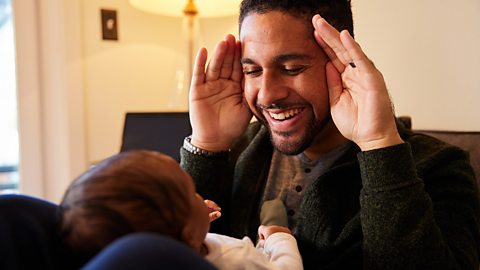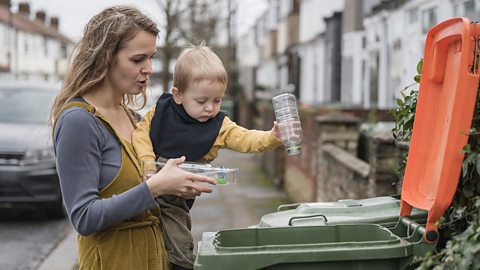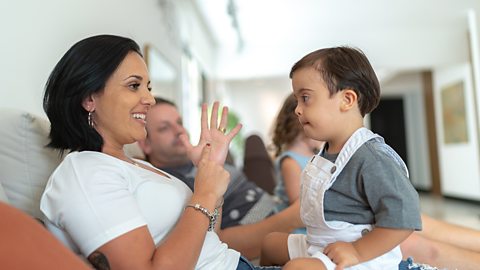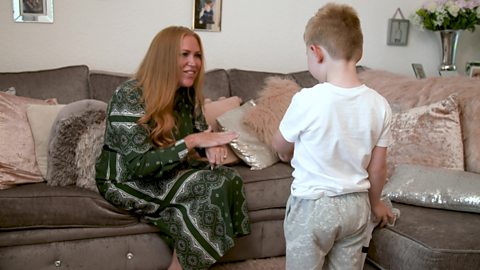Have you ever wondered what is the best thing you can do at home to help your little oneÔÇÖs speech and language development?
We've listed a couple of strategies below recommended by speech and language therapists. You can easily slot all of them into your everyday conversations or playtime with your baby, toddler or child.
From the day they are born, your baby picks up on your cues and learns from everything you do and say to them. ThatÔÇÖs why itÔÇÖs never too early to help your little one learn the building blocks of language. You are their best teacher.
DonÔÇÖt try to do all the tips on this list at once - pick out the ones that you can easily incorporate into your routine and build on them gradually. Soon youÔÇÖll be doing all of them without even noticing.
Remember to be patient, have fun, and celebrate your child's progress along the way!

Tips for helping your baby develop speech and language skills
1. Narrate what you and your baby are doing
Narrating what you and your baby are doing can help your child learn new words and understand their meaning.While you are changing a nappy, giving baby a bath or feeding them, you can describe what youÔÇÖre doing.
This helps them understand what is happening and learn new words at the same time.
2. Get face-to-face
When you talk to your child, try to get down to their level and make eye contact.
When babies are born, they can't focus properly on anything more than twenty centimetres in front of them. So by getting face-to-face, your baby will be able to track your mouth movements, keep eye contact and hold their attention on you for longer.
Doing this from an early age helps them pick up on facial expressions and body language. These are both crucial parts of understanding communication and making conversation when they get older.
3. Use objects, pictures or gestures whilst talking
Using objects, pictures or gestures alongside talking can help your child build connections between words and objects.
For example, you can point to your mouth when saying the word "eat" or show your child a picture of Grandma before visiting her.
Having visual cues alongside new words can build neural pathways in the brain and also help build understanding before theyÔÇÖre saying words.
4. Talk about what catches their eye
It is important to follow your child's lead and talk about what interests them.
If they look at or point to an object, encourage them by talking about and describing it.
The part of the brain that controls your ability to switch your attention from one thing to another does not fully form until youÔÇÖre an adult, so babies are more likely to learn new things when you follow their lead.
It also helps your child feel seen and valued and like theyÔÇÖre contributing to the conversation, even if they canÔÇÖt quite talk yet.

Tips for helping your toddler develop speech and language skills
5. Add one word to what your child says
When your child speaks, try to add one word to what they say.
A great example of this is if your child says, "Ball," you can tell them, "Yes, that is a red ball." This helps to expand their vocabulary and allows them to learn words in context.
This technique is called language expansion.
6. Use repetition
Toddlers' brains need repetition to learn and thrive. Repeating words or phrases can help reinforce new vocabulary.
You donÔÇÖt need to repeat everything you say. Think about emphasising certain words that you notice you are using a lot or that your child is interested in. For example, the name of a toy at playtime.
Nursery rhymes are also helpful for building repetition into your childÔÇÖs day.
7. Use more statements and fewer questions
During playtime, try to avoid asking your child lots of questions about what they are doing. This could get overwhelming for a child and, in particular, a toddler might struggle to answer.
Instead of asking questions, try using statements to describe what's happening. For example, you could say ÔÇ£You have 6 apples in your basketÔÇØ, instead of, ÔÇ£How many apples are in the basket?ÔÇØ
This will help your child learn new words and develop their understanding of sentence structure. If you do use questions in play, try the next tip
8. Give them time to respond
When you do ask your little one a question, give them plenty of time to respond - up to 10 seconds if you need to.
This gives them time to process your words and form their own thoughts and ideas.
Encourage them to answer with as many words as they can and don't be afraid of long pauses. You may be surprised by the thoughtful responses that come out when given the time to think.

Tips for helping your preschooler develop speech and language skills
9. Ask open-ended questions
Asking open-ended questions can encourage your child to use their language skills and express their thoughts and feelings.Instead of asking yes or no questions, try asking questions that start with ÔÇÿwhatÔÇÖ, ÔÇÿwhereÔÇÖ and ÔÇÿwhyÔÇÖ. This will encourage longer and more complex responses from your preschooler.
You can ask questions about anything - how theyÔÇÖre feeling, what they did today, or why they think something happened.
10. Model correct phrases instead of correcting your child
When your child makes a mistake or uses incorrect grammar, it's important to avoid correcting them directly.
Instead, model the correct phrase or grammar in your response.
For example, if your child says, "Me want biscuit," you can respond with, "You want a biscuit? Here you go." This way, your child can learn the correct phrase or grammar by seeing it in action. This is a great way to reinforce good language habits without making them feel like they are being corrected.
11. Start exploring word sounds
Recognising sounds in words is called phonological awareness and it's key for your childÔÇÖs reading and writing skills when they start school.
One of the best ways you can help your little one develop their understanding of this is simply by playing games that focus on letter sounds and rhymes. This could be ÔÇÿI spyÔÇÖ, singing nursery rhymes, or even changing the words of nursery rhymes.
Find out more
If you're worried about your child's speech and language progress, why not try the ? It's a quick questionnaire which helps you see how your baby or child is getting on with their speech, language and communication development.
For more information about language development and loads more advice from our panel of experts, check out our full language development collection.
All of our activity films have been created with these language strategies in mind. If you are struggling to slot any of these into your daily routine, why not have a browse of our activity pages for some inspiration?






